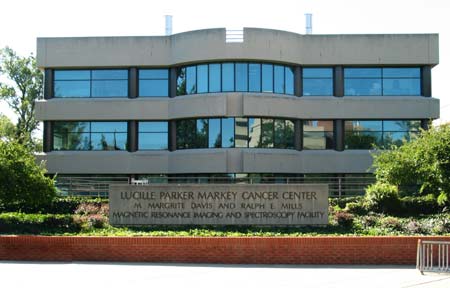Markey Receives Funding to Improve Community Cancer Education in Eastern Kentucky
University of Kentucky researchers Robin Vanderpool and Mark Dignan are leading projects funded by the National Cancer Institute’s Center to Reduce Cancer Health Disparities to continue Markey Cancer Center’s community-based efforts aimed at reducing cancer rates in Appalachia. Both programs are funded for three years.
Appalachian regions, particularly in Eastern Kentucky, have disproportionately high rates of both incidence and mortality due to cancer when compared to other regions in the United States. Poverty, lack of access to health care, poor diet, tobacco use, and lack of exercise conspire together to produce high rates of preventable cancers in Appalachia.
The UK Markey Cancer Center brings together numerous disciplines and universities throughout Appalachia to research and implement community-based solutions to help reduce the rate of cancer in the region. The additional funding received supports two projects: the National Outreach Network (NON) and a Geographical Management of Health Disparities Program (GMaP).
The NON program provides funding to support a community health educator (CHE) who will be strategically integrated into Markey Cancer Center’s cancer prevention and control activities. Through NCI’s National Outreach Network, the CHE is linked to a collection of evidence-based resources and programs to increase access to accurate and culturally tailored cancer information, education and outreach activities to improve local cancer health disparities.
The CHE role will enhance coordination of cancer prevention and control activities with the Markey Cancer Center, GMaP investigators, Kentucky Cancer Program (KCP), Kentucky Cancer Consortium, and other state, regional, and local community partners. Mindy Rogers, who recently served as regional cancer control specialist with KCP in the Cumberland Valley region of the state, will serve as the NON CHE covering Kentucky’s Appalachian communities.
GMaP includes partners at the cancer centers of Johns Hopkins University and the University of Virginia, as well as health disparities researchers at the University of South Carolina. GMaP will focus on increasing research training opportunities in our region, mentoring students and investigators early in their careers, and work with the NON CHE to reach out to the community.
UK is the University for Kentucky. At UK, we are educating more students, treating more patients with complex illnesses and conducting more research and service than at any time in our 150-year history. To read more about the UK story and how you can support continued investment in your university and the Commonwealth, go to: uky.edu/uk4ky. #uk4ky #seeblue
MEDIA CONTACT: Allison Perry, (859) 323-2399 or allison.perry@uky.edu
